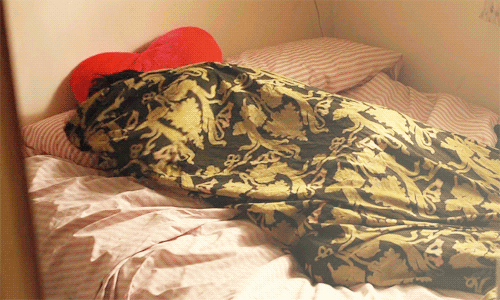
You have periods when you feel high (elated) for no obvious reason.
Yes, it's true
No, it's not true
You get into moods where you feel very low (depressed) for no obvious reason.
Yes, it's true
No, it's not true
You sleep less than 8 hours a day.
Yes, it's true
No, it's not true
You find it hard to leave your comfort zone and keep communication with your family and friends to a minimum.
Yes, it's true
No, it's not true
You talk fast and have difficulty expressing your thoughts. Therefore, people sometimes have a hard time understanding you. Instead of talking to people face to face, you prefer using messengers or email.
Yes, it's true
No, it's not true
You lost interest in the things you used to be passionate about and didn't take up new hobbies or interests.
Yes, it's true
No, it's not true
You tend to do first, and then think. People often describe you as an impulsive, spontaneous person.
Yes, it's true
No, it's not true
Your appetite has changed. You eat less than you used to or you started to eat uncontrollably.
Yes, it's true
No, it's not true
You're easily distracted and often switch from one task to another. This affects your overall performance in a negative way.
Yes, it's true
No, it's not true
You have long and frequent periods of feeling tired and lifeless.
Yes, it's true
No, it's not true
You're very self-confident when it comes to your abilities. You consider yourself smarter than most people.
Yes, it's true
No, it's not true
You have problems with memory, concentration, and decision-making.
Yes, it's true
No, it's not true
You engage in reckless and risky activities, e.g. sex with a stranger, shopping without any particular purpose, reckless driving, etc.
Yes, it's true
No, it's not true
From time to time, you realize that your life has no meaning and brings no satisfaction.
Yes, it's true
No, it's not true
You don't have bipolar disorder
Having a few sympthoms of bipolar disorder is absolutely normal. After all, most people have mood swings from time to time. If you have 10 or more sympthoms, you should talk to your doctor. Only a trained medical professional can diagnose this disorder, and diagnosis is key to getting proper treatment. If you ignore the problem, it may develop into a serious neurosis that will affect you entire life. If any of these sympthoms make you feel nervous or uncomfortable, be sure to make a hormone test. Hormonal problems tend to cause depression and mood swings pretty often. If your hormone levels are fine, you can take the next step and see a therapist or psychoneurologist. We wish you every happiness!
You should be worried
If you have most of the sympthoms, you have a good reason to worry. On one hand, you may feel extremely restless or impulsive, have a decreased need for sleep, and feel overly happy or “high” for long periods of time. Those are the sympthoms of mania. On the other hand, you may be losing interest in activities that you once enjoyed or having problems with memory, concentration, and decision making. Those are the signs of depression. An important thing to understand here is that a psychological disorder is an illness that needs professional treatment. When you have a toothache, you go to the dentist, right? Don't ignore the problem and don't be afraid to see a specialist to make your life better. Start with a hormones test. It's not uncommon that hormonal imbalance causes depression and mood swings. We wish you every happiness!














